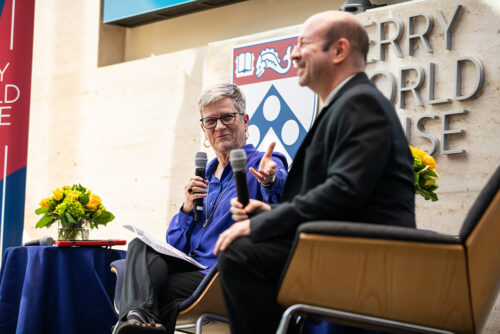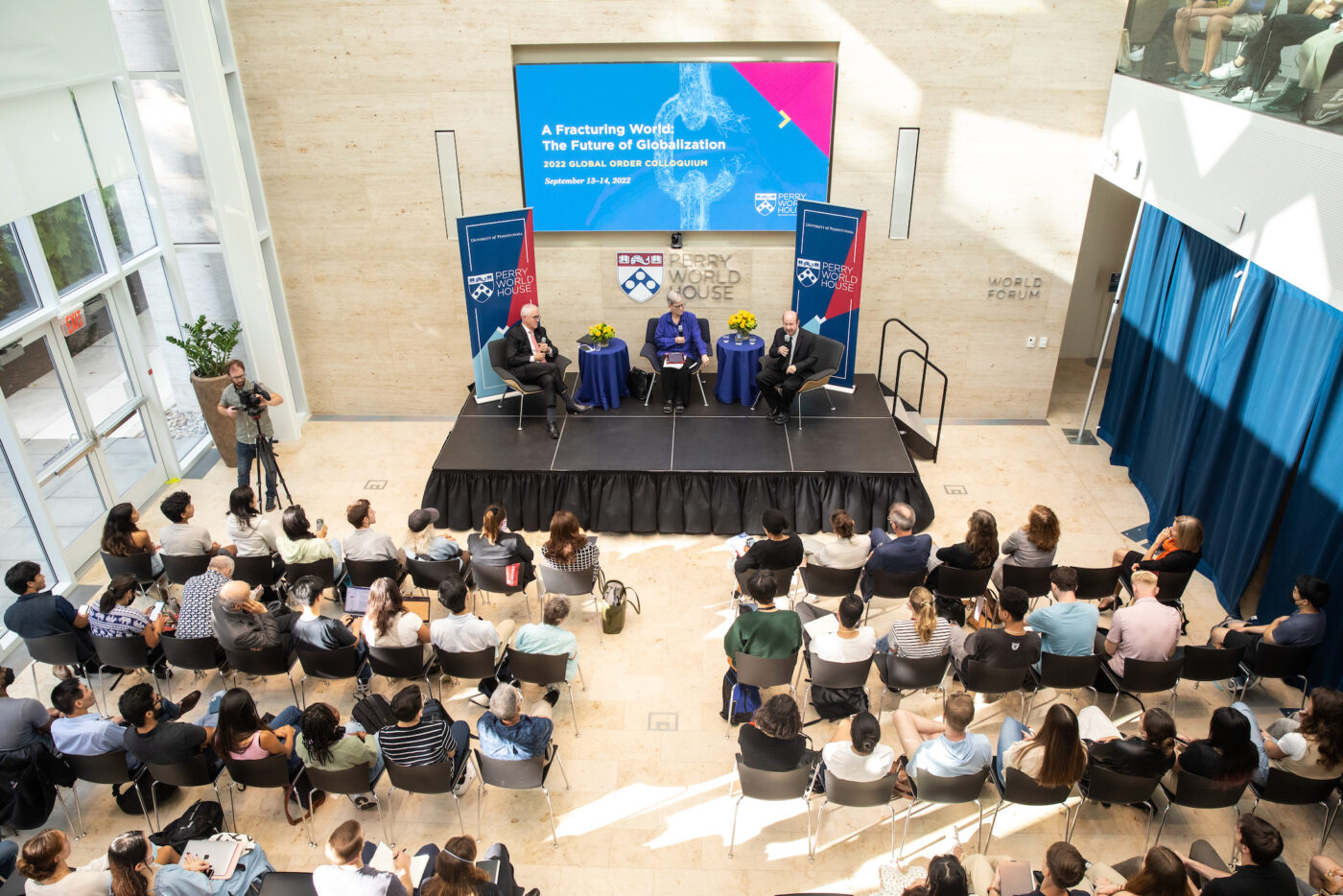A conversation between Penn climate scientist Michael E. Mann and former Australian Prime Minister Malcolm Turnbull, moderated by Kathleen Hall Jamieson of the Annenberg Public Policy Center, launched the new Penn Center for Science, Sustainability and the Media.
The Sept. 13, 2022, event was the lead-off session at Perry World House‘s two-day 2022 Global Order Colloquium, which examined what the future of globalization looks like in a world that is increasingly fractured, through a series of panels with experts from government, media, and across the University of Pennsylvania.
[Read about the entire colloquium at Penn Today.]
Penn President Liz Magill, in introducing the panel, noted that “the topics they will tackle could not be more urgent or more global in scope.” Recent headlines, from devastating droughts in Europe and sub-Saharan Africa, to record-breaking heat, storms and wildfires in the United States, highlight the increasing threats of climate change.

“These grave challenges are increasingly the norm,” Magill said. “Much like a pandemic, climate change does not respect international borders, does not distinguish among cultures or languages, and is a global fact. If we want to weather what is coming, then we need a global response. We also need the very best and brightest that great universities like Penn can provide.”
Mann, a Presidential Distinguished Professor in the School of Arts & Sciences’ Department of Earth and Environmental Science, with a secondary appointment in the Annenberg School for Communication, is an APPC distinguished research fellow and the director of the new Penn Center for Science, Sustainability and the Media. The talk was the inaugural event for PCSSM, which is a partner organization of the Annenberg Public Policy Center (APPC).
Turnbull told the audience that nations around the globe already have the means and tools “to have abundant energy at affordable prices delivered in a reliable manner with zero emissions,” pointing to wind and solar energy and batteries that can store it all. However, he said, climate change denial is standing in the way.
“We have been bedeviled by crazy politics and crazy media,” he said, citing Rupert Murdoch’s Fox News as the main contributor to the problem. “If we can replace ideology and idiocy with engineering and economics, we can get the job done. And that’s what we should be seeking to do.”
Mann recounted his sabbatical in Australia a few years ago, which coincided with one of the most profound climate-driven extreme weather events in Australian history.
“I first came face to face with the impacts of climate change in Sydney during what is now known as the Black Summer, the summer where Australia witnessed unprecedented heat and drought and wildfires that literally blanketed the continent,” he said.

He said he didn’t do as much research as he’d planned during his stay, but rather spent much of his time talking about the context for the extreme weather events, explaining how climate change was behind the real-time disasters that were playing out. That’s also when he first met Turnbull.
“I think what bonded us was our mutual dislike of Rupert Murdoch and News Corp. and our willingness to call out bad actors in the media,” he said. “As Malcolm explained, we have the technology to address the climate crisis. We can do it now with the energy technologies we have. The obstacles aren’t technological; they are political.”
Australia offers a lot of lessons that the U.S. could heed, especially just two months out from the midterms, Mann said. Of particular note is Australia’s resistance to Murdoch’s dominant media narrative and the country’s ability to elect a government that defied that narrative of climate denialism and delay.
He said it’s not overstating things to say that the upcoming midterm elections will determine the course of future action on climate in the United States and therefore globally.
“If we don’t lead on this issue, it is unlikely that we can bring other nations, especially developing nations, to the table to join in this effort,” he said. “This is a really critical moment. If we don’t have a functioning democracy, we’re not going to be able to address any of the major challenges we face, including the climate crisis. This is a moment of great opportunity but also of great peril.”
Mann and Turnbull went on to discuss how Australia appeared designed to be maximally impacted by climate change and how the U.S., the largest cumulative carbon emitter, needs to own up to its legacy. They also pointed to how the current gatekeeper of American climate policy is one lone coal-state Democrat, Joe Manchin of West Virginia. They also highlighted voting rules in Australia that helped enable the nation’s climate change agenda: compulsory voting, no gerrymandering, and ranked-choice voting.
Wrapping up the event, Jamieson asked them what they hoped attendees would take away from the discussion.
For Turnbull, it was simple: “Vote.”
“Urgency and agency,” said Mann. “We need dramatic action. It’s not too late.”
Watch the colloquium on Perry World House’s YouTube channel:

